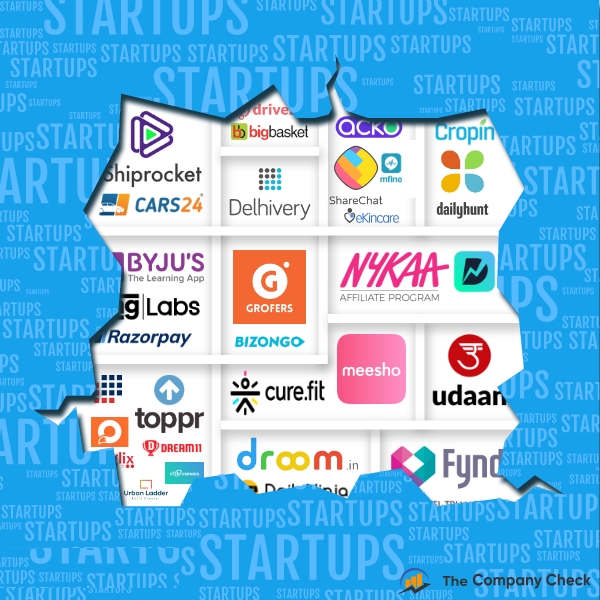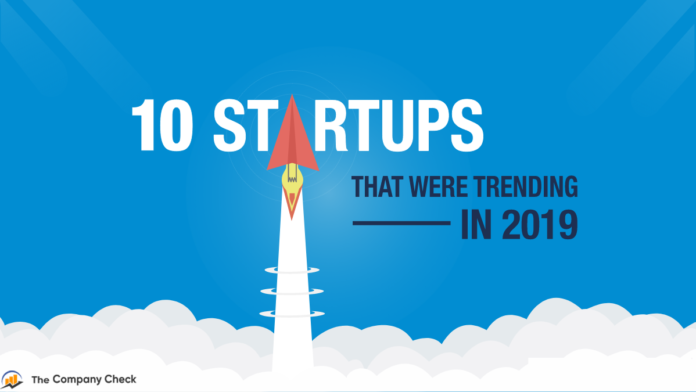The startup ecosystem in India has witnessed tremendous growth in recent years. India continues to reinforce its position as the second largest startup ecosystem in the world with the addition of more than 1,300 Indian startups this year so far. India also witnessed the addition of seven Unicorns this year till August taking the total tally to 24 – the third highest number of Unicorns (companies with valuation of over $1 billion) in a single country in the world. This fantastic business year is coming to an end, with many Indian startups making headlines. We’ve listed ten such startups that managed to grab eyeballs in 2019.
CureFit
CureFit is presently seen as one of the most trusted brands in the health and fitness industry. It was founded in 2016 by Myntra co-founder Mukesh Bansal and senior Flipkart executive Ankit Nagori. Since the initial phase, the startup has shown tremendous potential and growth in the market. The company is now valued at more than $575 million. CureFit has raised about $290 million in capital till date, including the latest round.
CureFit is building a platform which offers health, wellness, food and merchandising through multiple brands. This includes a chain of 180 fitness centres under the brand CultFit, a healthy food and delivery service under EatFit with over 35,000 deliveries per day, a few healthcare clinics called CareFit, and 35 centres for its mental wellness service under the brand MindFit. This expansion investment is expected to fund CureFit’s expansion plans in India and globally.
Delhivery
Sustenance in the logistics market is a challenge, as it is already dominated by players like Fed Ex, DTDC, and Bluedart, which is why startups in this field need to be deeply funded to stay in the game.
Started in 2011 with five co-founders and a handful of delivery boys, Delhivery has now over 2500+ employees who service a 600 strong-client base across express and fulfillment logistics. Delhivery changed the game by focusing on packages getting delivered to customers within half an hour when they started testing the waters of e-commerce. What started out with delivering food soon became a strong delivery network for e-commerce companies.
Delhivery raised funding of $395 million in its Series F round to become the first Indian unicorn of 2019. “Over the past three years, we have evolved into a ‘complete supply-chain solutions’ providing core e-commerce technology and logistics services for everyone in the ecosystem,” says Sahil Barua, Co-founder and CEO, Delhivery.

Shiprocket
Shiprocket began as ‘Kartrocket’ in 2012. But Co-founder and CEO Saahil Goel says that demand from their direct-to-consumer seller base was the highest for logistics. “Smaller sellers had trouble running the shipping due to smaller volumes. So, we launched as a new product ‘ShipRocket’ in 2016.”
According to their press statement, Shiprocket currently ships to around 220 countries and across 26,000 pincodes in India with 15 courier partners on board. According to Goel, the company has recorded an annualized revenue run-rate of between of $15-20 million.
Taking Amazon as a benchmark in doing business, Shiprocket is all pulling out all stops by targeting 3 million monthly shipments by 2020, and taking the logistics game to a whole new level in India.
Meesho
With the e-commerce wave turning tides in the global market, Indian startups trying to chip in and fill the gaps to make this wave bigger. One such startup is ‘Meesho’. The name literally translates to ‘meri dukan’. They cater to sellers who have their customers on social media platforms such as Facebook, WhatsApp and Instagram.
Founded by IIT-Delhi alumni Vidit Aatrey and Sanjeev Barnwal in 2015, the startup claims to have a network of more than 2 million resellers from 700 towns who largely deal with apparel, home appliances and electronics items. With up to 90% of Meesho’s customer base being women, the startup wants to empower homemakers who are ambitious about starting their own business. Meesho became one of the top startups in the country this year post raising $125 million in a new financing round for business expansion. The company has raised more than $215.2 million till date and the total market valuation of the company stands at $650 million.
Grofers
Grofers has one of the most awe-inspiring stories, as the company literally rose from its ashes after reporting huge losses of Rs 225 crore in 2016 and laying off close to 100 employees. But the founders, Albinder Dhindsa and Saurabh Kumar kept their hopes intact, and their decision to pivot to an inventory-led model paid off.
Presently Grofers has raised around $220 million in its Series F funding round, which CEO and Co-founder Albinder Dhindsa claims was at a valuation of around $800 million. This is a major turnaround for Grofers, which is set to be India’s next unicorn.
The online grocery market has grown big-time in India since it was born. Having decided to invest fresh funding in Tier I cities, Grofers aims to turn profitable by the end of this year and consolidate its position by targeting a particular segment of customers who buy fresh fruits and vegetables not from supermarkets but from the ‘kiranas’.
Udaan
The Bengaluru-based B2B online marketplace made headlines when it gained the status of becoming one of the fastest startups to achieve a Unicorn status back in 2018. Yet again in 2019, Udaan was the talk of the town when the startup raised $585 million from a clutch of investors, one of the largest late-stage rounds this year, valuing the company at nearly $2.8 billion.
It is a marketplace which connects traders, wholesalers, retailers and manufacturers on a single platform via a mobile app. Udaan is run by Hiveloop Technology Pvt. Ltd, founded in 2016 by former Flipkart employees Amod Malviya, Sujeet Kumar and Vaibhav Gupta.
Udaan has three million retailers across 900 cities and connects them to 25,000 sellers across 200 cities. It offers supply chain, lending, payments and marketing capabilities, enabling these sellers to source products and services from large manufacturers and distributors.

Droom
Scripting his success story in a unique way, Sandeep Aggarwal, an MBA from Washington University in St. Louis, USA, spent 16 years gaining experience in business operations, strategy and investment, focusing on internet and technology. Droom got incorporated in June 2014, in Singapore and went through two rounds of fund raising.
In 2019, Droom raised $200 million in its round for funds, potentially taking the market value of the venture to more than $1 billion. The company plans to use these funds to develop its machine learning and AI capabilities, expand into South East Asian countries, branding and further build its ecosystem services.
Byju’s
Talking about successful Indian startups and unicorns, Byju’s is leading the race. The world’s most valued education technology firm has made history in its ongoing Series F funding round. It saw its valuation rise to $5.5 billion earlier this month, a jump of nearly 53 per cent.
Although such valuation jumps within a round are uncommon, Byju’s rapid growth has made it possible. After all, it has not only been growing at 100% for the last three years but also turned profitable on a full year basis in FY 2018-19.
Byju’s has the highest leverage today among India’s unicorns vis-a-vis prospective investors. Its moves to expand its global footprint and launch new course material for students.
Nykaa
Nykaa, an online cosmetic and wellness product store had a booming 2019 by becoming one of the most favored brands in the Indian cosmetic market. Inspired by Sephora, Nykaa claims to receive 40 million visitors a month of which 15 million are unique visitors and they have more than 1000 brands on their website.It has raised Rs100 crore ($14 million) from Singapore-based TPG Growth IV SF. Its valuation has now reportedly touched $724 million, making it a strong contender for the revered unicorn club in its next round of funding.
Falguni Nayar, Nykaa’s founder and CEO, has said that the company is now looking to push its new initiatives like Nykaa Man, the men’s grooming business, fashion and apparel categories along with expanding the company’s offline stores from 35 currently to 70 by March 2020.
1 Mg
E-commerce has now paved the way for e-pharmacies as it expands. 1Mg is one such startup which created waves in 2019, when it closed a $70 million investment round led by Corisol Holdings.
1Mg is an online marketplace for medicines and lab tests launched in 2013 by Prashant Tandon, Gaurav Agarwal, and Vikas Chauhan. The company sells all kind of medicines at discounted rates from its mobile applications and website.
The firm plans to utilize the funds to expand its labs business to 100 cities, its e-pharmacy business to tier-III towns and villages, and grow its data science team to build new products such as a digital doctor and AI health bots.
Find out more about other companies and Indian startups trending in the market at The Company Check!



